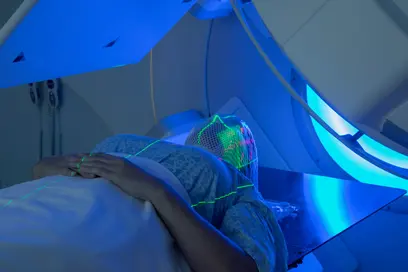Cancer in children can take very different courses of severity. Since its treatment often entails late adverse effects, it is important to be able to assess the further course of the disease as accurately as possible. This applies especially to brain cancer, because surgery, radiation therapy and chemotherapy may cause lasting damage to the young patients’ brains and lead to developmental disorders and other long-term damage.
Brain tumors have taken the place of the more common blood cancers when it comes to cancer mortality in children. The biology of pediatric brain tumors is extremely variable. There are multiple types of brain tumors, which differ not only among each other but also within one and the same type. Customized treatment approaches targeting tumor-specific cellular changes might substantially improve treatment of these cancers.
Stefan Pfister leads the Division of Pediatric Neurooncology at DKFZ and works as a pediatrician at the University Medical Center for Children and Adolescents of Heidelberg University. Pfister and his team are analyzing the genomes of the three most common pediatric brain tumors: low-grade astrocytoma, medulloblastoma and ependymoma. The research is part of the International Cancer Genome Consortium and is funded by Germany's Federal Ministry of Education and Research and the German Cancer Aid (Deutsche Krebshilfe).
In the past few years, Stefan Pfister and his team have discovered a number of biomarkers for disease progression and treatment response. Some of these are already being applied in the clinic. In addition, they also identified genetic changes that are potential targets for therapy. In more than half of all low-grade astrocytomas, the researchers found a defect in the cancer-promoting BRAF gene. This discovery opens up new treatment options for affected children, because there are already approved substances available inhibiting the mutated BRAF gene.
Medulloblastoma is the most common pediatric brain tumor and is newly diagnosed in more than a hundred patients in Germany every year. Based on a number of characteristic genetic alterations, Pfister and his colleagues were able to classify these cancers into five distinct risk groups. When treating children in the group with the best prognosis, clinicians can now venture to reduce treatment intensity to prevent possible late effects of the treatment. The genetic test can be performed in routine diagnostics and identifies high-risk patients, who would not be identified using conventional tests. These children can receive more intensive treatment from the beginning of therapy to increase their chances of cure.
With the translational part of the German Cancer Award (Deutscher Krebspreis), now in its tenth year, the German Cancer Society (Deutsche Krebsgesellschaft, DKG) distinguishes research which translates experimental approaches into clinical research. Along with Professor Dr. Stefan Pfister, the second award-winner in the category “Translational Research" was Professor Dr. Roman Thomas from the Max Planck Institute for Neurological Research in Cologne. The experimental part of the German Cancer Award went to Professor Dr. Lars Zender from Tübingen University Hospital and the clinical award went to Professor Dr. Volker Heinemann of Munich University Hospital and to Dr. Alexander Katalinic from Lübeck University. The awards were presented on March 21 during the International AEK Cancer Congress at the European Molecular Biology Laboratory (EMBL) in Heidelberg.
A picture of Stefan Pfister is available at the internet:
Portrait_Pfister.jpg



